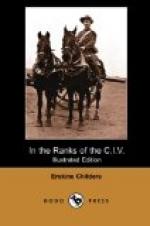across him. In his mind’s eye he saw this
prosaic tub sublimed into a romantic pool, and girdled
by a rockery, in whose mossy crannies errant trickles
of water might lose themselves, and perhaps fertilize
exotic flora yet unborn. At this moment I espied
a wheelbarrow in the distance, and went for it with
that purposeful briskness, which may sometimes be
used in fatigues of this sort to disguise your real
intentions. For it is of the greatest importance
in a fatigue to have an implement; it is the outward
symbol of labour; if observation falls on you, you
can wipe your brow and lean on it; you can even use
it for a few minutes if necessary. Without some
stage property of this sort only a consummate actor
can seem to be busy. Well, I got to the barrow
just in time. There were two; a Grenadier Guardsman
got the other, and amid envious looks we wheeled them
off towards a heap of rubble in the offing, “conveniently
low.” Then, with a simultaneous sigh of
relief, we mechanically produced our pipes and tobacco,
found comfortable seats against the pile of rubble,
and had a good chat, lazily watching the genesis of
the naiad’s grotto in the distance. When
we had had a good smoke, and fought our battles over
again, we got up and saw signs that the fatigue was
guttering out; so we put a few stones in each of the
barrows, and, well content, journeyed back to the scene
of operations, and laid our stones round the base
of the tub, more because we knew nowhere else to lay
them than for any other reason, for the sergeant-major
had apparently forgotten his grandiose designs in
other schemes, and had disappeared. The fatigue
party was thinning. The corporal said what may
be freely translated as “disappear quietly,”
and we made off to our camp, where I found Henry, who
had doctor’s leave to be excused fatigues, being
lame.
CHAPTER XII.
A DETAIL.
September 18, continued.—At two
we paraded again with our kits, and about a dozen
of us marched off to the Rest camp, which is the next
stage. Everything was very hurried, but Henry
had just time to tell me that he was ordered to Bloemfontein,
when I had to start. We said good-bye, and I
don’t suppose will meet again till London.
The Rest camp was about four miles off, on the other
side of Pretoria. Arrived very hot and dusty.
Waited some time, and then was told that I must go
to the Artillery Barracks, another two miles in quite
a different direction. I might just as well have
gone there direct. However, I was lucky enough
to get a lift for my kit and myself most of the way,
and landed about 5.30 at a collection of big, red-brick
buildings outside the town, was handed from person
to person for some time, and finally found a resting-place
on the floor of a huge bare room in a sort of a tin
outbuilding, where some 150 R.A. men of all batteries
were sitting or lying on their kit round the walls
and down the centre; like lost souls, I pictured them,




